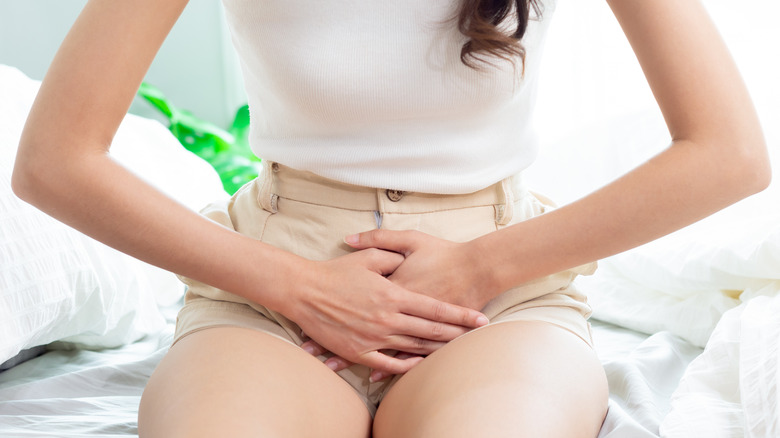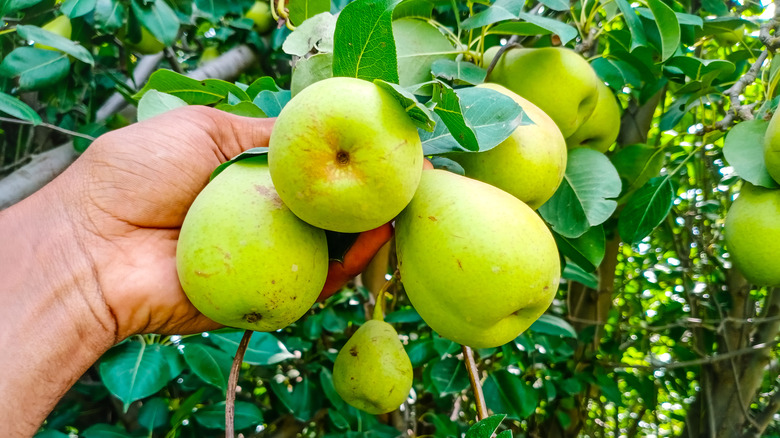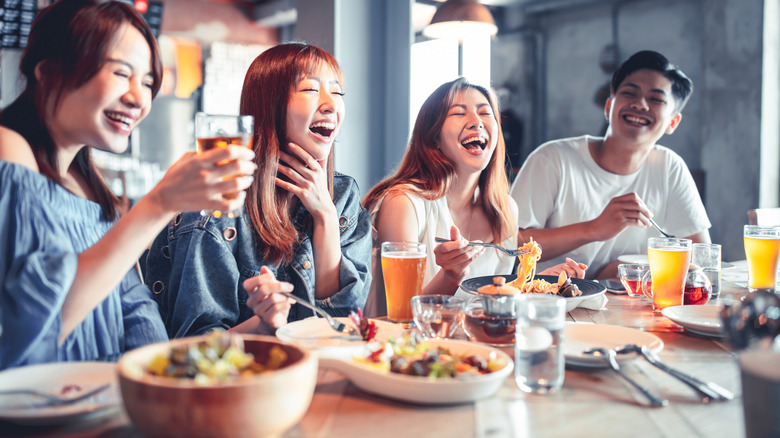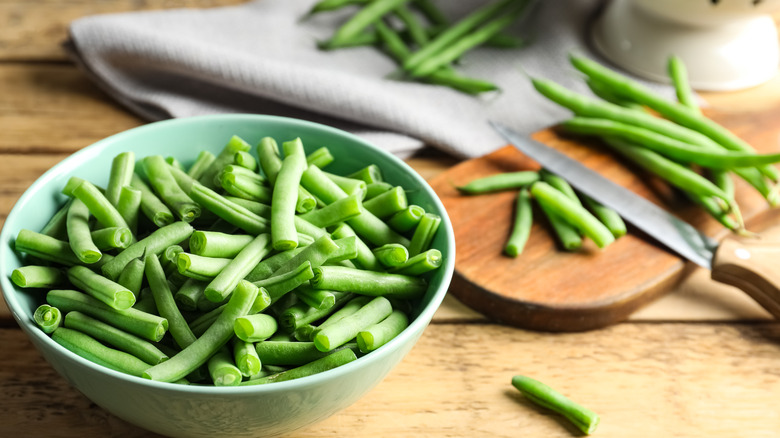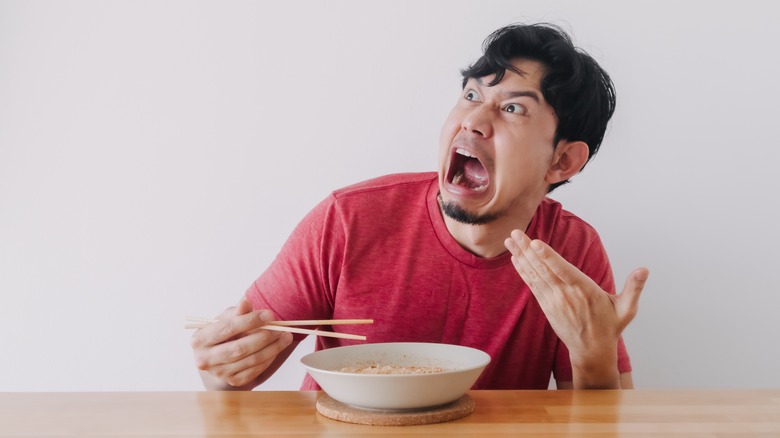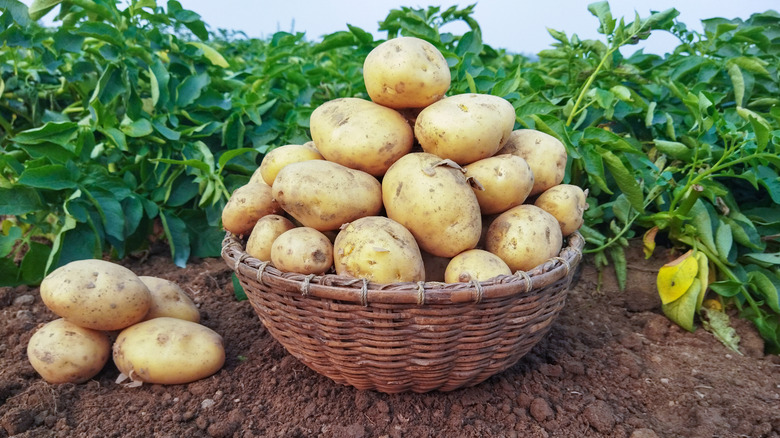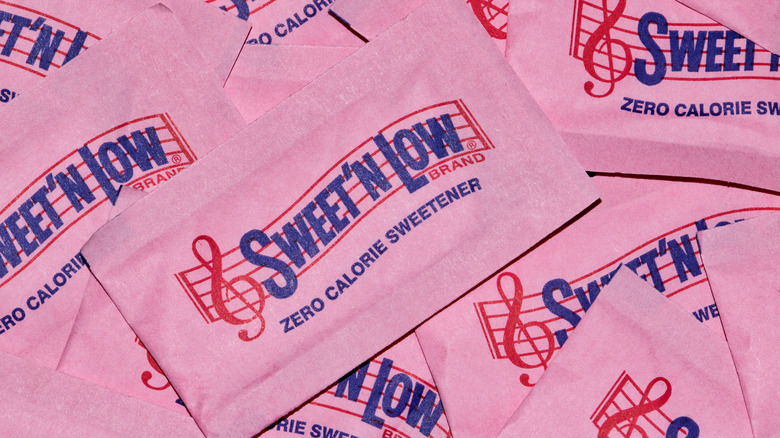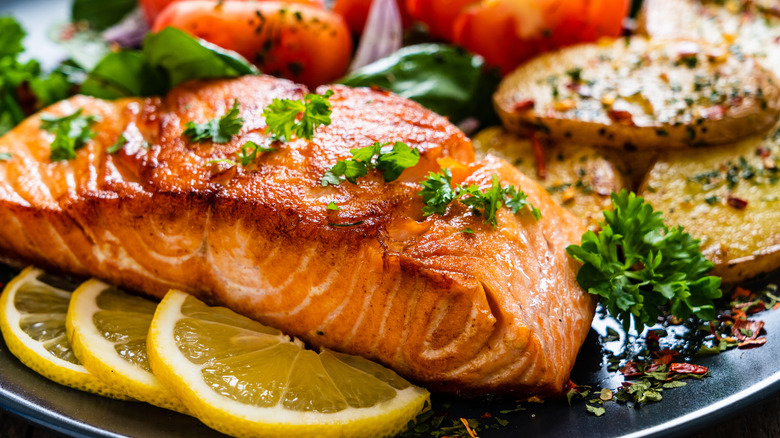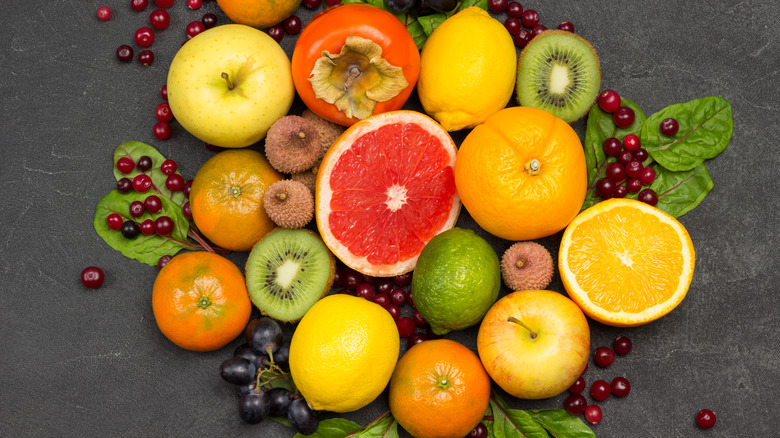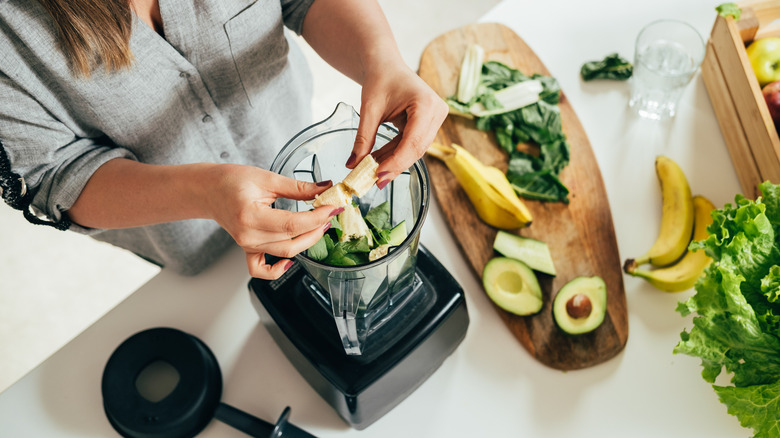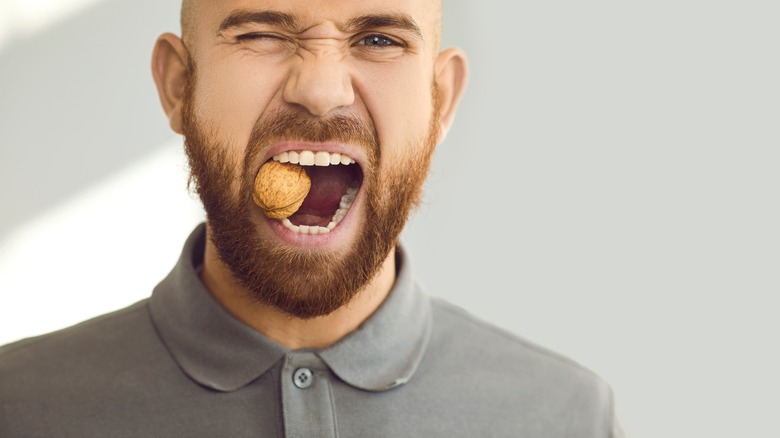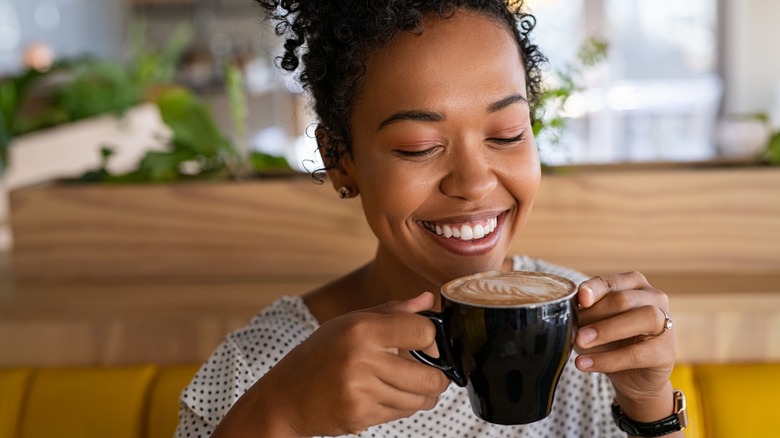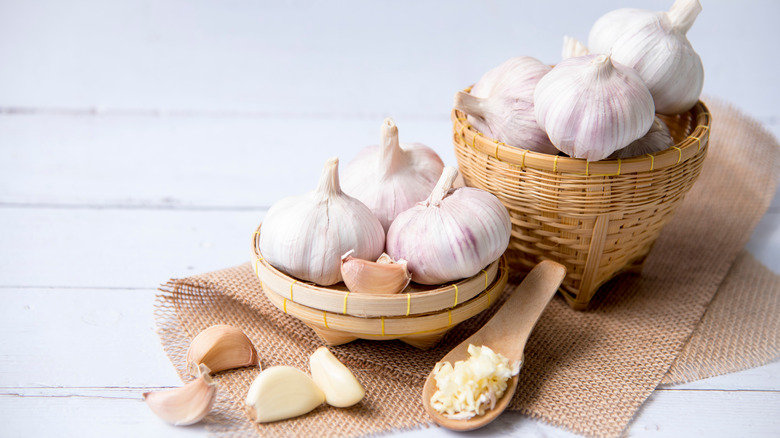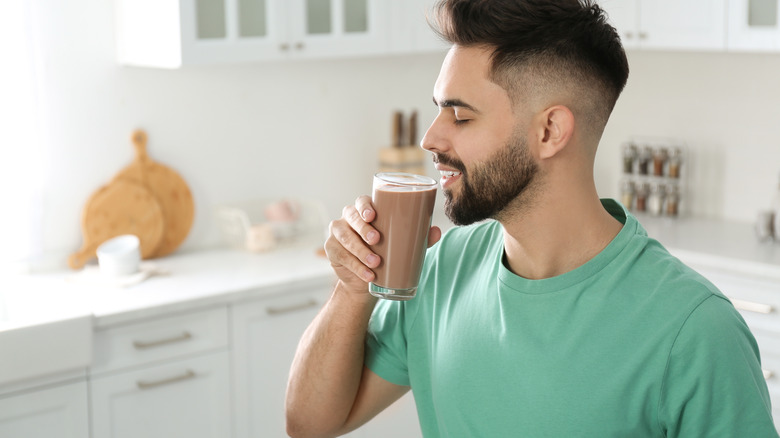7 Foods To Eat And 7 To Avoid For Bladder Health
The bladder is one of those organs you take for granted until it stops working properly. Your bladder holds about 1.5 to 2 cups of urine. However, when your bladder lining is irritated, it can cause painful urges to use the bathroom even if you can't urinate. Frequent bladder irritation may also make it difficult to hold in your urine, making for embarrassing accidents. Of course, you should always see an urologist if your bladder problems are affecting your quality of life. But while you're waiting for your appointment, one of the things you can do today is take a look at your current diet. According to the National Institute on Aging, some problems can come from eating foods that aggravate your bladder. But on the flip side, there are other foods jampacked with essential nutrients that promote good bladder health.
Your diet will thank you if you keep away from bladder irritants and add beneficial foods into your diet. Let's dig into what you should eat, and which foods you should set aside, for your bladder health.
Eat: Pears
Pears tend to take a backseat to their more popular relative, the apple. But research shows pears are a powerhouse for maintaining good bladder health. One reason is for their high fiber content — one pear has 6 grams of fiber, which is 21% of the recommended daily fiber intake. The National Institute on Aging lists high-fiber food as essential for reducing pressure on the bladder and avoiding the risk of constipation.
Not only are pears high in fiber, they also contain lots of water, which helps with daily bowel movements. Medical News Today explains that the water content in pears softens stools, creating a laxative effect that helps remove toxins from the body. A natural acid ingredient found in pears is malic acid, which is helpful for stopping the formation of bladder stones. A 2016 study published in European Review for Medical and Pharmacological Sciences found evidence of malic acid and antioxidant activity in pears. The malic acid is a precursor to citrate, which stops crystals from growing in the bladder, and eventually prevents bladder stones. A 2022 review also suggested there is evidence of pears helping to reduce a person's risk of bladder cancer (via Nutrients).
Avoid: Alcohol
In science, chemists consider alcohol a solution, but for your bladder it's more of a problem. Alcohol is a bladder irritant that can make any existing urinary tract infections (UTIs) go from bad to worse (via Healthline). While one glass of your favorite Pinot Grigio may seem harmless, the alcohol increases your urine's acidity level, aggravating UTI symptoms. Additionally, alcohol and antibiotics have similar side effects, which can create a synergistic effect. So if you are taking an antibiotic to treat a UTI infection, alcohol can enhance side effects such as drowsiness, dizziness, and an upset stomach.
Drinking alcoholic beverages and having preexisting bladder problems can also increase your risk for wetting the bed at night. According to the National Association For Continence, over 5 million American adults have bedwetting issues. And while alcohol by itself does not cause bedwetting problems, it is a diuretic and causes increased urine production. This would make someone need to use the bathroom more often, which is a problem for people vulnerable to bladder leaks.
Eat: Green beans
Whether you call them snap beans, string beans, or green beans, this vegetable does more than add a colorful side dish at the dinner table. According to Livestrong, green beans are natural diuretic that many people incorporate into their diets. Green beans are also helpful for lowering inflammation and carry many vitamins and minerals good for bladder health such as vitamin C and magnesium. Magnesium is important because it helps prevent muscle spasms that can reduce the risk for urinary incontinence. According to the National Association for Continence (NAFC), research has shown that taking vitamin C from foods can proactively help with reducing the feeling of needing to urinate constantly. Green beans are also a good substitute for vitamin C supplements, which the NAFC says can aggravate the bladder more and cause problems holding the urine.
Preventing a sensitive bladder in the first place is the dream and green beans can help achieve this goal. Providence Health & Services lists green beans as one of many plant foods that can lower your risk of bladder diseases later on in life.
Avoid: Spicy foods (when you have a UTI)
Beyoncé proudly sang in "Formation" that she carries hot sauce in her bag to give bland food a bit of a kick. But while a few drops of Sriracha sauce can transform a plate from good to mouth-watering, your bladder may pay the price hours later. According to Everyday Health, spicy foods are bladder irritants – and when you have a urinary tract infection (UTI), these foods can make your symptoms worse.
While you're dealing with a UTI or other bladder problems, the National Association for Continence recommends removing hot and spicy foods from your diet for at least a week to see if your symptoms get better. After that week is up, they say you can gradually reintroduce spicy food to your palate every one to two days while keeping a close eye on any changes to your urination or bladder control.
Eat: Potatoes
Not all foods have to be dropped like a hot potato, and well, potatoes are one of them. Peering beyond the high amount of carbohydrates we know and love potatoes for, you'll find these brown spuds are chock-full of nutrients you body needs to function properly. For example, potatoes are a rich source for fiber and while it does wonders for cleaning up your gut, it also helps in keeping your digestive system moving and flush out any irritating bacteria. What's more, the high-carb and high-fiber food helps to fill you up faster, lowering the chance of eating another food that is a bladder irritant. According to Well+Good, if you eat sweet potatoes, you're also inviting in potassium and protein into your body, which can calm your bladder.
Now, not every potato-based dish is created equal — the method of preparation can either help or greatly harm its healthfulness. Processed potato products such as chips and French fries carry fried oil and other ingredients that negate the health benefits of potatoes. WebMD warns that potato chips are high in salt, and eating salty foods causes the body to keep more water. The retained water, along with the thirstiness that comes from eating high-salt foods, may cause you to urinate more often.
Avoid: Sugar and artificial sweeteners
There's nothing sweet about Splenda for your bladder. A 2021 study published in the International Urogynecology Journal found that adding artificial sweetener to your tea and coffee, or drinking other artificially sweetened beverages like soda, can cause the symptoms of overactive bladder syndrome, most notably frequent and uncontrollable urges to urinate.
Actual sugar can also cause problems. According to the National Association for Continence, sugar triggers the bladder to think it needs to empty itself, causing involuntary urine leakage. Another issue is that excess sugar ups your blood sugar levels. Having high blood sugar indirectly raises the amount of urine made in your body and increases the risk of urinary urgency or leakage. Sugary foods also lead to weight gain, adding strain to pelvic floor muscles and making it harder for them to hold in urine when you don't have immediate access to a restroom. Finally, taking in high amounts of sugar can lead to frequent urinary tract infections (UTI). That's because the bacteria that causes UTIs thrive on sugar. Sugar increases your urine's acidity level, making it an ideal environment for bacteria to stay alive in the bladder and replicate itself, spreading the infection and making symptoms worse.
Eat: Seafood like swordfish or salmon
If you're trying to plan your next meal, your bladder would love if you looked no further than under the sea. Seafood such sardines or swordfish are rich sources of vitamin D — a vital nutrient for the bladder. According to Healthgrades, low vitamin D levels increase your risk for an overactive bladder, urinary tract infections, and bladder cancer. Another benefit of eating fish is that it's chock full of omega-3 fatty acids. A 2018 research study published in the Journal of Pediatric Urology found that eating foods high in omega-3s could help with controlling bedwetting in children and teens. While you may not want to overdo it on the fish, the Interstitial Cystitis Association recommends mixing up your dinner plate twice a week with 3 ounces of cold-water oily fish like mackerel or tuna instead of chicken or beef.
One important reminder: If you are planning to prepare a chunk of salmon for dinner, consider baking or steaming the fish. Fried food may irritate your bladder.
Avoid: Citrus fruits (when you have a bladder infection)
Having some amount of vitamin C is good for the bladder, but if you already have an overactive bladder, it could do you more harm in the long run. Healthline explains that citrus fruits such as oranges, limes, and grapefruits have a high amount of citric acid that can make you lose control of your bladder — obviously something you want to avoid if you already have an overactive bladder. This is because citrus increases the acidity of urine. For this reason, foods high in vitamin C are not the best option when it comes to treating bladder infections. A 2021 study published in the Journal of Microbiology, Immunology, and Infection showed evidence that having urine with high acidity increases colonization of the bacteria that causes a UTI.
Healthline recommends that after your bladder infection, you should try eating less acidic foods such as apples or bananas. Also, they suggest keeping a watchful eye on which fruits make your trips to the bathroom more unpleasant.
Eat: Leafy Greens
Everyone knows vegetables are good for your health, but leafy greens in particular work wonders for the bladder. Leafy greens such as spinach and bok choy are listed as some of the least bothersome foods for the bladder, according to the Interstitial Cystitis Association. A 2016 study published in the journal Medicine looked at how eating different types of fruits and vegetables affected the rate of urinary tract infections in older men. The research team found that eating more dark and leafy vegetables decreased the risk of lower urinary tract symptoms by 37.2%.
The National Association for Continence explains that leafy vegetables contain multiple vitamins to help control your bladder. The vitamin C in leafy greens can help lower the feeling of needing to urinate urgently without aggravating an already leaky bladder. Dark leafy greens like kale and arugula are also rich in magnesium, which helps your bladder to fully empty while lowering the number of bladder muscle spasms. It can also help with improving symptoms of urinary incontinence.
Avoid: Tomato-based foods
Lay off the marinara sauce when your bladder is giving you trouble. According to WebMD, eating too many tomatoes or tomato-based products worsens the symptoms of an overactive bladder. Tomatoes are acidic, meaning they make your urine more acidic too (via Healthline). A 2015 study published in the journal Urologia Internationalis reported a positive relationship with urine acidity and having an overactive bladder, noting that overactive bladder symptoms were more prevalent in people with acidic urine compared with those that had nonacidic urine. The researchers suggested that changing a person's diet to include foods that lower a urine's pH, such as plums and cranberries, would improve symptoms of an overactive bladder.
Cranberries can help, but if you're set on making a delicious Italian dish, they wouldn't be a great substitute. To make your bladder happy and satisfy your pasta cravings, Aeroflow Urology recommends switching your tomato sauce for one made of oil, garlic, oregano, and feta cheese.
Eat: Nuts
Despite what society has made you believe, some fatty foods are good for you and can be good for your bladder as well. According to Livestrong, cancerous chemicals in urine can irritate the bladder and increase your risk for a tumor. However, taking omega-3 polyunsaturated fats could lower inflammation and your risk of a urinary tract tumor. According to the Interstitial Cystitis Association, nuts such as walnuts, pecans, and macadamia give you a rich source of omega-3 and is especially helpful for people with a bladder disorder called interstitial cystitis.
Not so nutty for nuts? If you had to pick one, walnuts would be the way to go. This is because in addition to their omega-3 content, walnuts are high in antioxidants, which are helpful for boosting your immune system and decreasing inflammation. An alternative choice would be almonds. These nuts have anti-inflammatory properties because they are high in magnesium. Try packing a few in a bag and eating them as a snack on your way to work.
Avoid: Coffee in excess
If you're finding yourself running to the bathroom in the morning, it's likely because of your morning cup of joe. As you may already know, coffee has a high amount of caffeine. That may be great to help you to stay alert and focused at work, but too much can send your bladder activity into overdrive, says Healthline. Caffeine stimulates not only the feeling of needing to pee, but the actual need to pee. Indeed, a 2011 study published in Urology Annals found that people with an overactive bladder who drank more than 4.5 mg/kg of coffee experienced a frequent urge to urinate frequently. Another effect is a leaky bladder.
Caffeine's effects may also depend on your gender. A 2013 study found that women who drank over two servings of coffee a day experienced more urgency to urinate versus men. Both genders experienced a worsening of lower urinary tract symptoms (LUTS) after drinking too much coffee. However, the researchers found that drinking citrus juice reduced LUTS by 50% — so, those with bladder problems may want to rethink their morning beverage of choice. "The first approach to treatment for many urinary symptoms, including urinary incontinence, is dietary modification," Jeannine Miranne, a urogynecologist at Brigham and Women's Hospital, told Brigham Health Hub. "We start with limiting fluid intake and identifying which foods and beverages may contribute to bladder irritation." She recommends reducing your caffeine intake or substituting herbal or weakly brewed tea for more highly caffeinated drinks.
Eat: Garlic
Garlic is not only for flavoring a dish or warding off vampires (just kidding on that last one) — it also carries amazing health benefits. According to Healthline, chopping or crushing garlic cloves can extract sulfur compounds needed for healing. When these sulfur compounds are ingested, they travel over the body to protect against organ damage from heavy metal toxicity. The Cleveland Clinic explains that fresh garlic also possesses antibacterial properties and helps eliminate bacteria such as salmonella and E.coli that can cause food poisoning.
Garlic is great on the body, but it has direct effects on the bladder as well. Research published in 2014 in Case Reports in Medicine reported two cases of women with recurring UTIs from E.coli bacteria that were resistant to antibiotics. When these women shifted to a garlic-centric diet, they showed an improvement in their symptoms. A follow-up of both women a year later showed their UTIs did not reappear, indicating that garlic may be a viable alternative medicine for treating recurrent UTIs in people who developed antibiotic resistance — though more research would be needed to confirm this effect.
Avoid: Milk chocolate
Bad news for people with a sweet tooth: Chocolate is not the best for your bladder. The Interstitial Cystitis Network says that chocolate, especially cheap milk chocolate products, have multiple ingredients that irritate your bladder. Some of these include theobromine, caffeine, phenylethylamine, tannins, and oxalates. CNN reports the caffeine in chocolate could contribute to symptoms of an overactive bladder. Additionally, they say the high amount of sugar can also cause irritation to the bladder lining.
Depending on what chocolate you choose, you could wind up consuming a good amount of caffeine. According to Healthline, one serving of chocolate has the same amount of caffeine as a quarter cup of coffee. But that doesn't mean you have to quit cold turkey. If you're craving chocolate, Healthline recommends limiting your candy load and going for chocolates with less or no caffeine, such as white chocolate or small servings of dark chocolate.

